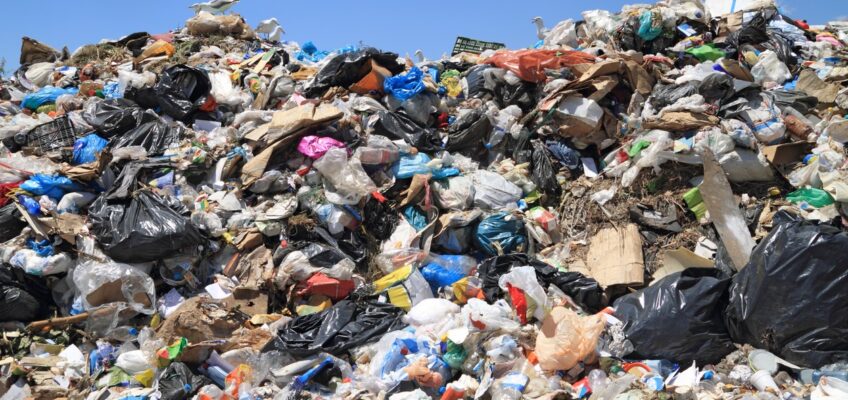On May 18, citizens in Waukesha County, WI will have their last chance to comment on a highly controversial effort to move a hazardous waste landfill. The event will be held by the Wisconsin Department of Natural Resources.
On the table is a proposal by Waste Management, Inc (WMI) to exhume hazardous materials from one landfill, bring it to another area adjacent to a Superfund site, and then start landfilling the exhumed landfill. An estimated 1.3 million cubic yards of toxic waste, including 10 million gallons of liquid hazardous waste, would be moved from the Boundary Road Superfund site in Menomonee Falls to the Orchard Ridge Landfill.
The waste was buried over the course of many years, beginning in 1954. WMI purchased the site and additional acreage in 1971 and the landfill was closed soon after that. The site was put on the National Planning List in 1984 but not fully capped until 1999. The last DNR/EPA Five-Year Review Report found the site to be protective of human health.
The plan would create 76.6 acres of new disposal capacity that includes a 17-acre vertical expansion over a portion of a 44-acre expansion that started accepting waste in 2019. Contaminated soils would fill nearly 5 acres of wetlands and be used in various other landfill construction projects.
An array of regional environmental and civic organizations are opposing the plan, raising concerns about the widespread contamination that could be unleashed through this process. These organizations include the Midwest Environmental Advocates, Milwaukee Riverkeeper, Sierra Club (Great Waters Group), Waukesha Environmental Action League (WEAL), League of Women Voters of Milwaukee County, and Wisconsin Conservation Voters.
“We are dealing with a horrible Waste Management (WMI) plan without an Environmental Impact Statement for moving a landfill of dangerous materials,” said Charlene Lemoine of WEAL. Cheryl Nenn of Milwaukee Riverkeeper stated, “We are quite concerned about the potential water contamination and community impacts. It is unclear how this waste would be excavated in a way that protects our rivers and public health.”
Penney Waggoner, a Menomonee Falls activist who has compiled a mailing list of some 100 plus deeply concerned citizens, explains that the size of the proposed landfill exhumation is enormous: 58 acres is the equivalent of nearly 44 football fields including end zones. Waggoner said that “There is no way that highly toxic organic chemicals and volatile compounds and liquids buried for over 50 years can be moved without unknown consequences and unknown mitigation strategies.” A high school, two grade schools, homes and businesses, “will be bathed in escaped toxic particles and vapors.”
Citizens point out that there were no health or safety reasons given for the project. Also, given WMI’s past irregularities, many are questioning why the DNR would waive the requirement for a full Environmental Impact Statement. They also question why the County or Village did not negotiate for additional fees or safety precautions. At minimum, informed citizens want to require the following measures:
- A full Environmental Impact Statement
- Proper monitoring
- Pretreatment of leachate before release into the Menomonee River
- Prior testing to determine what is going to be exhumed
- Special containment infrastructure
- And a permanent monitoring committee formed similar to the one created for the Franklin Metro Landfill in Franklin, WI (Milwaukee County).
Despite the requests by local and regional organizations for an informational hearing, Menomonee Falls and Waukesha County did not originally request an informational hearing. These jurisdictions earn $3 million in “Dump Dollars” that are paid annually to Menomonee Falls from the Superfund site. Waukesha County gets 10% of the fee, an increase from 5% when the agreement was signed in 2017. The host payments will continue with the proposed expansion.
Calls to County and Village officials to comment on the proposed project were not answered.
Rob Lee, a staff attorney for Midwest Environmental Advocates, has assessed the situation. Wisconsin’s landfill siting law (WI Chapter 289) restricts local government authority over landfill siting to negotiate with the applicant over concerns like well testing and odor control, but if an agreement cannot be reached or if local governments do not participate in negotiations, surrounding communities could end up with fewer environmental and public health protections.
Lee feels that local officials and citizens had not been fully informed about the project and therefore were at a disadvantage when they negotiated an agreement with Waste Management for this expansion. Nowhere in that agreement does it mention that the expansion involves exhuming an active Superfund site. “Now, DNR has determined not to complete an EIS for this expansion despite what appears to be an obvious need, potentially depriving the public of an opportunity to weigh in based on all the information.”
Activists are anticipating one of three outcomes from the hearing, none of which will be immediate because comments will be accepted until the 28th and then the DNR has to review all “information” from the hearing. The activists preferred outcome is for the DNR to decide the project is not feasible and deny the permit. Second, the DNR can decide to request an Environmental Impact Statement by the EPA, which would result in extensive research over the next year. Third and least preferable is for the DNR to approve the proposal and the project will continue.
This is the final point for the public to try to stop the exhumation. (If the EPA does do the EIS, there will be one last opportunity for public comment.) Citizens and elected officials should pay attention.
The DNR has posted all documents on their website pertaining to the situation
(click on the Landfill Feasibility tab).





